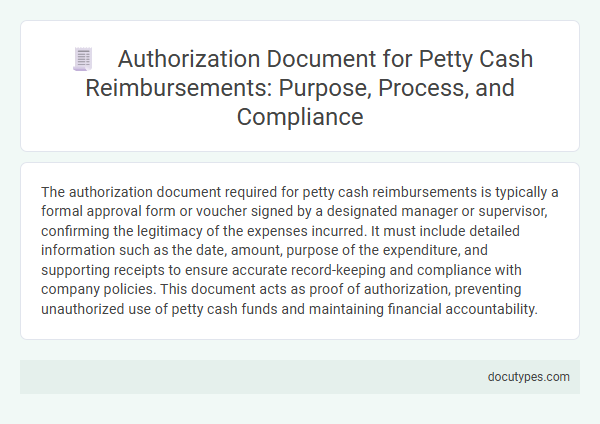The authorization document required for petty cash reimbursements is typically a formal approval form or voucher signed by a designated manager or supervisor, confirming the legitimacy of the expenses incurred. It must include detailed information such as the date, amount, purpose of the expenditure, and supporting receipts to ensure accurate record-keeping and compliance with company policies. This document acts as proof of authorization, preventing unauthorized use of petty cash funds and maintaining financial accountability.
Introduction to Authorization Documents for Petty Cash
Authorization documents for petty cash reimbursements serve as official approval forms that validate expenses before disbursing funds. These documents ensure that all claimed expenses comply with company policies and are properly recorded for financial accountability. Understanding the requirements for these authorization documents helps you streamline the reimbursement process and maintain transparent financial management.
Purpose of Petty Cash Reimbursement Authorization
The authorization document for petty cash reimbursements serves as official approval for expenses incurred, ensuring proper financial control and accountability. It verifies that the expenditure aligns with company policies and budget constraints.
This document prevents unauthorized spending by requiring formal permission before reimbursement. It acts as a record to support audit trails and maintain transparency in petty cash management.
Key Elements of an Authorization Document
An authorization document for petty cash reimbursements is a formal approval required to validate the disbursement of funds for small, routine expenses. It ensures accountability and controls within an organization's petty cash management process.
Key elements of an authorization document include the employee's name requesting reimbursement, a detailed description of the expense, and the exact amount requested. The document must also feature the date of the expenditure and the signature of an authorized approver, such as a manager or finance officer. These components collectively provide a clear audit trail and prevent unauthorized use of petty cash funds.
Eligibility Criteria for Petty Cash Reimbursements
The authorization document required for petty cash reimbursements ensures that all expenses meet the organization's approval standards. This document verifies eligibility and provides accountability for petty cash disbursements.
Eligibility criteria for petty cash reimbursements define which expenses can be approved under petty cash policies to maintain financial control.
- Expense Relevance - Only expenses directly related to business activities and minor operational costs qualify for petty cash reimbursement.
- Receipt Submission - Reimbursement eligibility requires submitting original receipts or proof of purchase with the authorization document.
- Spending Limits - Petty cash reimbursements must fall within predefined financial limits as specified by company policy.
Standard Petty Cash Reimbursement Process
The authorization document required for petty cash reimbursements typically includes a detailed expense report signed by a supervisor or manager verifying the legitimacy of the expenses. This document ensures that all petty cash disbursements follow the company's approval policies and maintain accountability. You must submit the authorization document along with original receipts to complete the standard petty cash reimbursement process.
Roles and Responsibilities in Authorization
The authorization document required for petty cash reimbursements ensures clear approval of expenses before funds are disbursed. This document typically includes details such as the expense description, amount, and approval signatures to maintain financial control.
Roles and responsibilities in authorization involve the requester submitting valid receipts and justifications for the petty cash use. You must ensure that the approver verifies these details and grants permission, safeguarding compliance with organizational policies.
Documentation Requirements for Compliance
| Authorization Document for Petty Cash Reimbursements | Documentation Requirements for Compliance |
|---|---|
| Petty Cash Voucher | A detailed petty cash voucher is essential to authorize reimbursements. It must include the date, amount requested, purpose, and the recipient's signature to ensure legitimacy and traceability. |
| Approval Signatures | Signatures from department heads or authorized personnel validate the reimbursement request. These approvals confirm that expenditures adhere to company policies and budget limits. |
| Original Receipts | Submission of original receipts or invoices is required to verify actual expenses. Receipts should clearly state the vendor, date, amount, and description of goods or services purchased. |
| Expense Description | A concise explanation of the expense justifies the need for petty cash usage. Documentation must clearly indicate how the expense relates to business operations. |
| Compliance with Internal Policies | The authorization document must align with the organization's petty cash policy, including specified limits and allowable expense categories to maintain regulatory compliance. |
| Audit Trail Provision | Proper documentation creates a clear audit trail for internal controls and external audits. This ensures transparency, minimizes fraud risk, and supports financial reporting accuracy. |
Approval Workflow for Petty Cash Requests
What is the authorization document required for petty cash reimbursements? The authorization document is typically a petty cash request form that outlines the purpose and amount of the reimbursement. Your approval workflow ensures that the request is reviewed and signed off by the designated manager before funds are disbursed.
Common Compliance Challenges and Solutions
The authorization document required for petty cash reimbursements serves as official proof that the disbursement is approved and compliant with company policies. Ensuring this document meets regulatory standards helps prevent financial discrepancies and unauthorized spending.
- Incomplete Documentation - Missing signatures or dates can lead to rejection of reimbursement claims.
- Policy Non-Compliance - Submitting receipts that do not comply with expense policies can cause audit issues.
- Verification Delays - Lack of thorough review slows down reimbursement processing and approval.
You can overcome these challenges by maintaining proper documentation, adhering strictly to company policies, and conducting timely verifications.
What Is the Authorization Document Required for Petty Cash Reimbursements? Infographic

